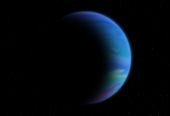
Purpose
To calculate what your age would be if you lived on another planet.
Additional information
Did you ever wonder how old you would be if you lived on another planet? Using a simple calculation against the planetary year, you can do just that!
Sponsored Links
Required materials
- Notebook or paper
- Pen or pencil
- Calculator
Estimated Experiment Time
About 5 to 10 minutes
Step-By-Step Procedure
- 1. First off, find a group of volunteers with various ages. This experiment is best done with your family.
- 2. Make a simple chart on your paper that has four columns: Name, Earth Age, Planet, Planet Age. Enter the names of your volunteers in the first column. If you have 3 volunteers, you would end up with 3 rows. See sample below:
|
Name
|
Earth Age
|
Planet
|
Planet Age
|
| [Volunteer 1] |
|
|
|
| [Volunteer 2] |
|
|
|
| [Volunteer 3] |
|
|
|
- 3. Next, ask the volunteers for their Earth age (their REAL ages) and enter them into the second column:
|
Name
|
Earth Age
|
Planet
|
Planet Age
|
| [Volunteer 1] |
8 |
|
|
| [Volunteer 2] |
13 |
|
|
| [Volunteer 3] |
43 |
|
|
- 4. Now ask your volunteers what their favorite planet is! Once you have the planet, write it in the third column, like so:
|
Name
|
Earth Age
|
Planet
|
Planet Age
|
| [Volunteer 1] |
8 |
Venus |
|
| [Volunteer 2] |
13 |
Mars |
|
| [Volunteer 3] |
43 |
Pluto |
|
- 5. Now that you have the name, earth age, and target planet, it's time to calculate your volunteer's ages! The age calculation takes on the following formula:
(earth age / period of revolution) == planet age
Refer to the chart in the NOTE section for the period of revolution value for the selected planet. Using the above formula, calculate everyone's age. See example below:
|
Name
|
Earth Age
|
Planet
|
Planet Age
|
| [Volunteer 1] |
8 |
Venus |
(8 / 0.615) = 13.00 |
| [Volunteer 2] |
13 |
Mars |
(13 / 1.88) = 6.91 |
| [Volunteer 3] |
43 |
Pluto |
(43 / 248.5) = 0.17 |
- 5. That's it! Now you know how old you and your volunteers would be on another planet.
Note
Please refer to the chart below for calculating your planetary age.
|
Planet
|
Period of revolution
(calculation metric)
|
|
Earth
|
td>
1.0 Earth years
(365 Earth days)
|
Jupiter
|
11.9 Earth years
(4343.5 Earth days)
|
|
Mars
|
1.88 Earth years
(686.9 Earth days)
|
|
Mercury
|
0.241 Earth years
(87.9 Earth days)
|
|
Neptune
|
164.8 Earth years
(60,152 Earth days)
|
|
Pluto
|
248.5 Earth years
(90,702.5 Earth days)
|
|
Saturn
|
29.5 Earth years
(10,767.5 Earth days)
|
|
Uranus
|
84.0 Earth years
(30,660 Earth days)
|
|
Venus
|
0.615 Earth years
(224.7 Earth days)
|
Observation
Have fun with this experiment and add a few more columns to calculate each volunteer's age on more planets.
Result
A planetary year is the length of time it takes that planet to revolve around the sun. The further the planet is from the sun, the longer it's period of revolution, and thus the longer its year.
Sponsored Links
Take a moment to visit our table of Periodic Elements page where you can get an in-depth view of all the elements,
complete with the industry first side-by-side element comparisons!